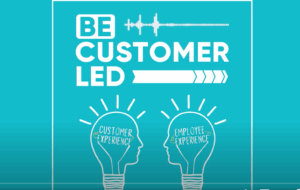Guest post by Mike Edelhart, co-producer and CEO of The Pivot Conference (@pivotcon)
Historic shifts in business fundamentals don’t occur smoothly; rather they happen in sudden, sharp shifts which open unexpected chasms companies must traverse or plunge.
Today, the deep change in human behavior brought about by the emergence of social media marks the latest such shift, perhaps the most dramatic since the Industrial Revolution. Gone are the traditional success factors of operational efficiency and price advantage being uprooted by the conversational, consumer-centric nature of the emerging business environment. Already, quick response, collaboration and flexibility are trumping traditional competitive advantages. And this shift seems to be accelerating into an ever-more-social future.
”Digital transformation is causing a tectonic shift in how companies are structured and led, and how they perform and compete…Digitization is increasing the pace of change throughout the economy, even in sleepy mainstream industries” notes Pierre-Yves Cros, Chief Development Officer of international consulting firm CapGemini. “These shifts are broad and deep and they’re just getting under way… No firm is immune from digital transformation.”
A study by CapGemini and MIT’s Center for Digital Business found that companies that have already responded most deeply to social challenges are 26% more profitable than laggards. Two measures separated those winning companies from others: Digital Intensity, the penetration of social, mobile and other emerging technologies deeply into customer engagement and business operations. Transformative Management Intensity, where a clear vision of how digital is changing the company expresses itself as alterations in governance, customer management and IT-business relationships.
Moving from rhetoric to reality in response to digital transformation is anything but straightforward. Current corporations have hired, trained and compensated a generation of employees around incremental operational improvements. They have, in short, an army optimized to fight the old war, as a new war roars upon them. This new war demands effective, quick response to whatever social/mobile data reveals and collaboration with a diasporic customer and influence population, all in a word where ownership of the prime relationship stands to overpower any other advantage.
A recent massive study by the Harvard Business School Forum on Innovation indicated that, in the end, only two variables may matter. This rigorous analysis of what separates successful companies from others uncovered these two rules: Better before cheaper—companies that compete on differentiators other than price win. Revenue before cost—companies that prioritize increasing revenue over reducing costs prosper more highly than others. How important are these two variable to success? The report concludes: “There are no other rules…. so change anything you must to follow Rules 1 and 2.”
So, the keys to digital transformation may come down to how companies can use social data to make their products “better” in the eyes of empowered consumers and so find new sources of revenue.
We also don’t need to look much further than my Pivot co-producer and someone with whom you already know very well. Brian Solis also published original research on the state of digital transformation and found, in his two reports this year alone, that companies are undergoing change to compete in a digital economy but most don’t know why. In his most recent study, Solis found that 88% of digital strategists and executives claimed that the digital customer experience was driving digital transformation efforts yet only 12% launched efforts to understand the digital customer journey.
Wow. Just wow.
Companies won’t fail in response to digital change because they don’t see it coming; they will fail because their organizations aren’t set up to respond in ways that can really save them. “Big companies are really bad at innovation,” says Harvard’s Maxwell Wessel. “Because they’re designed to be bad at innovation.”
Pivot Conference takes place October 16-17 at the NASDAQ Marketsite in Times Square NYC. Pivot is an invitation-only event for senior executives who lead social, mobile and business transformation initiatives for major corporations. Requests for invitation should be directed to: Matt Godson, matt@momentumevents.com







I’m amused that we are still talking about Digital as a new thing 30 years on – it was 1983 – 31 years ago – when the CD first entered our lives. We are talking here about Social as a new thing – the first social networks emerged in 1994 – 20 years ago and the major ones like LinkedIn (2003) and Facebook (2004) are over ten years old.
No-one can expect a business which is three decades behind the times to remain competitive – the question of its death is only when and where.
Perhaps large companies are used to the days when business technology trickled “down” to consumers (PC’s, email, word processing) and have to adapt to the current dynamic where consumer technology increasingly trickles “up” to business (social networking and BYOD, just to name two). Consumers are now very much in charge. We’ve reached a point when businesses simply cannot deny the fact that consumer-driven technologies have a massive impact on how business is done, especially when it comes to online commerce. The link seems obvious, but as Solis’s study showed, implementation lags tremendously. The recommendations from the Harvard Business School study are both spot on. But, following these two rules is a very tall order, and the bigger the company, the taller the challenge. It’s a matter of having the right infrastructure in place, then transitioning customer experience in an incremental manner, to create effective, sustainable change that raises revenue by delighting the customer and conforming to the way that today’s consumers want to do business.
I think a lot of good points are made in this. No longer are the days where companies are only sharing information with customers with no response back. Social media is the trend of the future and people like the interaction that they get with brands. How fast and often brands respond to consumers that reach out to them can have a huge impact on their brand image and how likely consumers are to come back to this brand next time. If you keep up with social media marketing you have a chance to develop a great dialogue with consumers but if you fall behind on this trend then you will definitely be struggling to keep up with competitors.